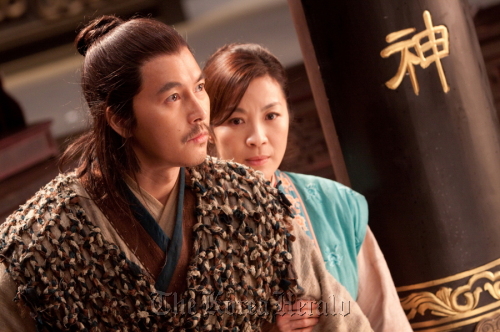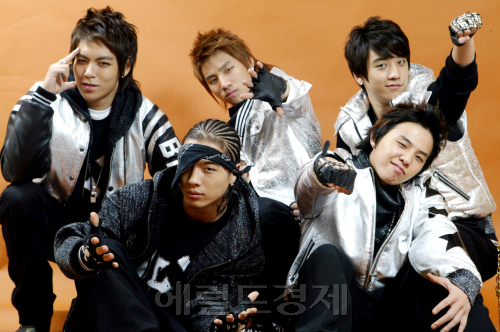For the past few years, the pulse of Korean entertainment has been in danger of flatlining.
Interest has been at an all time low because of a lack of original “killer content,” and for a while it seemed Korean pop culture had lost its relevance.
Now it is bouncing back, but on the strength of music and individual talent in film.
If the first generation of “Hallyu,” or the Korean Wave, spread throughout Asia on the back of popular television dramas, then this time actors and pop acts are leading the charge.
Film and music, it seems, have now become the two platforms for talent to bring back interest in Korean entertainment.
Bands like Girls’ Generation have over the past month stormed the Japanese charts while Korean actors such as Rain, Jang Dong-gun, and Jung Woo-sung have all headlined foreign-produced films.
It is almost as if overseas markets have become tired of waiting for content good enough to import, and are now only interested in hiring the services of Korean entertainers.
Original content
Korean actors like Jung Woo-sung who currently headlines the bill in John Woo’s latest sword-play epic “Reign of Assassins” portrays a Chinese character in the film rather than a Korean.
Interest has been at an all time low because of a lack of original “killer content,” and for a while it seemed Korean pop culture had lost its relevance.
Now it is bouncing back, but on the strength of music and individual talent in film.
If the first generation of “Hallyu,” or the Korean Wave, spread throughout Asia on the back of popular television dramas, then this time actors and pop acts are leading the charge.
Film and music, it seems, have now become the two platforms for talent to bring back interest in Korean entertainment.
Bands like Girls’ Generation have over the past month stormed the Japanese charts while Korean actors such as Rain, Jang Dong-gun, and Jung Woo-sung have all headlined foreign-produced films.
It is almost as if overseas markets have become tired of waiting for content good enough to import, and are now only interested in hiring the services of Korean entertainers.
Original content
Korean actors like Jung Woo-sung who currently headlines the bill in John Woo’s latest sword-play epic “Reign of Assassins” portrays a Chinese character in the film rather than a Korean.

Jung isn’t the first Korean to play a non-Korean in a foreign-funded film.
Rain and Jang, both of whom have recently starred in the Hollywood actioners “Ninja Assassins” and “Warrior’s Way,” both play characters with ambiguous nationalities.
Some say this type of talent over content approach could further obscure the identity of Korean pop culture.
“The local entertainment industry is more than capable of creating quality content, but because there isn’t much demand for material considered outside the mainstream, there is no variety everything is the same, created in the same mold as shows like ‘Winter Sonata’ and ‘A Jewel in the Palace,’” Lee Ho-jae, writer-director of last year’s sleeper hit “The Scam,” told the Korea Herald.
“The decline of the first wave of Hallyu can be attributed to our industry being insistent on relying on the popularity of its stars, rather than relying on the strength of our cultural content.”
Earlier in August, Lee said, “Film studios and broadcasters are responsible as well, because they treated the phenomenon exactly as its label implied like a trend, and they moved fast to squeeze it for everything it had. … The fact is, they’ve run out of ideas.”
For much of its 10-year existence, references to the Korean Wave or Hallyu has had skeptics and pop-culture talking heads cringing.
The term resembles the jingoism devised to provoke nationalist fervor in the hearts of Koreans.
It has since become a source of pride for many considering that popular culture from a tiny divided nation historically overshadowed by its two East Asian neighbors made headway into foreign territory.
That content born from the nation’s popular entertainment was setting the benchmark for its Asian neighbors might as well have been a victory in battle, as local press have often used military terms to describe the presence of Hallyu in foreign markets.
Local media made sure not to miss publicizing the rabid fan turnout in countries like Japan whenever television heartthrobs like Bae Yong-joon made routine visits.
Such reports further fueled the flame affirming the Korean Wave and legitimizing the label.
There’s even a theme park named “Hallyuwood” currently being built in Gyeonggi Province just on the outskirts of the capital.
But the Korean Wave has always rested on shaky foundations.
For one, the entire foundation of it was centered on Korean television serials such as KBS’ “Winter Sonata” which made instant continental idols out of actors Bae and co-star Choi Ji-woo.
Subsequent television soaps like the period drama “Jewel in the Palace,” “Stairway to Heaven” enjoyed robust ratings in Japan, China, and Southeast Asian countries and further strengthened the local broadcast industry.
Korean television networks and talent agencies should have used the opportunity to focus on creating more variety in their storytelling but the “if it ain’t broke, don’t fix it” mentality resulted in copycat series springing up, cluttering the airwaves.
Dramas became redundant with plot points played out in nearly identical fashion.
The only difference between one series and the next were the actors, and people quickly got bored.
So with the resurgence of the Korean Wave, what can be done to ensure it remains on the cutting edge?
Ben Richardson, general manager of MTV Korea, echoes Lee’s sentiments saying original content is the keystone to maintaining the presence of Korean entertainment overseas.
“I see that Korean dramas are still huge across Asia and no other local content form has surpassed that popularity,” Richardson told The Korea Herald.
“Japanese content and, increasingly, formats are popular because they are so unique. That’s really valuable when you’re trying to create formats.
Many industry experts believe it is for this reason the nine-member super group Girls’ Generation’s ascent in Japan and in other Asian countries has been possible.
Their immediate success has been largely credited to the band’s blend of “sexy and cute” which has gained nearly as many female fans as male fans.
In Japan, a large part of the fanbase for girl bands are made up of young men as it is believed local talent agencies market them as cute in order to have the singers come across as more approachable.
Korean music, the next big thing
Due to K-pop or Korean pop music becoming the new platform for the second wave, a shift in demographics has been happening.
When Korean television dramas hit it big, much of its viewership came from women in their 40s.
“Across Asia and the world we are seeing a new generation of Korean stars appealing to a younger audience and breaking out from the traditional Korean expatriate audience,” Richardson said.
“In the last 12 months I have witnessed Super Junior perform to 45,000 fans for MTV in Vietnam, the Wondergirls wow a mainly Muslim audience at Worldstage Malaysia, 2PM star in the Chinese music awards (MMH) and Big Bang sell out a stadium in Tokyo in record time for the VMAJ (MTV Video Music Awards Japan).”

With the help of cutting edge pop music, the average age of overseas K-pop fans has become younger and more hip.
“The second wave of (Hallyu stars) have better styling, slicker videos, better live production and as a result they are connecting better with young audiences,” Richardson added.
“I think they’ve learned the lessons of the past and as a result are seeing better results.”

However, Richardson is cautious over the current and future state of the Korean music industry, claiming Japan has an edge by maintaining revenue generated from record sales.
Album sales are seen by Korean music industry insiders as something of a farce due to digital downloading and piracy.
“Korea is very different (to Japan) in every aspect,” Richardson said.
“Music sales are primarily digital (in Korea). You get only a handful of international touring artists because of a lack of venues and limited economics. So perhaps Korean music is more organic, more home grown and more locally influenced. It seems therefore contradictory that Korean music is increasingly more export focused.”
He added, “(MTV) sees Korean music crossing borders and their labels more focused on supporting this migration. I also sense right now the Korean industry feels more optimistic that local talent can break into the U.S. and other non-Asian markets.”
Bernie Cho, president of the entertainment content group DFSB Kollective, whose clients include Epik High, Brown Eyed Girls, and Crying Nut, says the industry is at a precipice, citing shaky infrastructure and artist management as possible hurdles for emerging Korean artists looking to take their act to foreign markets.
“A lot of Korean music acts are crossing overseas not because they want to but because they need to,” Cho told The Korea Herald.
“Royalties generated from digital music sales can’t compare to sales of CDs.”
According to Richardson CDs still remain the choice apparatus for music listening among Japanese consumers, which he says helps sustain the industry and enables it to nurture variety in its content.
“The Japanese still buy CDs. In Shibuya you see giant foreign retail chains like Tower Records and HMV. Japan, because of the size of its population, also has a bigger live music scene with a lot more diversity of genres, venues and audience who have unique and distinctive tastes,” he said.
“Because of healthy CD sales you get a constant stream of international artists touring the country.”
Another factor mentioned as to why music is becoming a major platform for the Korean Wave, Richardson says, is its accessibility.
“It’s easier for music to travel, no language versioning. Music can live in many places soundtracks, games, films, so it just exports better,” he said.
Despite the fragility of the local music scene in Korea, it does have one edge over its Asian counterparts: Artists looking to enter foreign markets go through rigorous training in English, Chinese, Japanese, Thai, and other languages to make them as interactive as they can be with overseas fans.
Before the surge in popularity of K-pop, Japanese pop, or J-pop, set the standard throughout Asia enjoying immense popularity.
However, none of its acts took the time to learn new languages, keeping their relationship with their overseas fans distant and impersonal.
“The Japanese are now waking up to the importance of reaching an Asian audience,“ Richardson said.
“Many companies there really want to learn from the success of the Korean acts and expand regionally. J-pop was such a phenomenon for 10-15 years, without talent learning another language. Though times have changed. Language is important for audiences to connect to songs. It’s just common sense.”
By Song Woong-ki (kws@heraldcorp.com)


![[Exclusive] Korean military set to ban iPhones over 'security' concerns](http://res.heraldm.com/phpwas/restmb_idxmake.php?idx=644&simg=/content/image/2024/04/23/20240423050599_0.jpg&u=20240423183955)




![[Pressure points] Leggings in public: Fashion statement or social faux pas?](http://res.heraldm.com/phpwas/restmb_idxmake.php?idx=644&simg=/content/image/2024/04/23/20240423050669_0.jpg&u=)

![[Herald Interview] 'Amid aging population, Korea to invite more young professionals from overseas'](http://res.heraldm.com/phpwas/restmb_idxmake.php?idx=644&simg=/content/image/2024/04/24/20240424050844_0.jpg&u=20240424200058)








